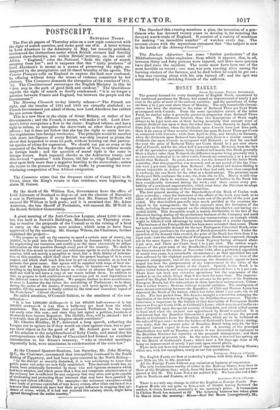POSTSCRIPT.
SATURDAY NIGHT.
The Fret- ch papers of Thursday seize on a new topic connected with the right of search question, and make good use of it. A letter written by Lord Aberdeen to the Admiralty in May, but recently published, condemned the instructions under which British cruisers had forcibly entered slave-factories, not within British: territory, on the coast of Africa. " England," cries the National, " finds the right of search escaping from her "; and it supposes that this " tardy prudence " of Lord Aberdeen's is meant as a means of preserving the right, en- dangered by the precipitation and ill-timed brutality of the agents. The Courier Frangais calls on England to expiate the fault now confessed, by effacing without delay the traces of violence committed by her cruisers. The Commerce demands the abrogation of the treaties of 1831, '33. The Constitutionnel encourages the English Ministry in this its " first step in the path of good faith and candour." The Quotidienue regards the right of search as finally condemned : " it is no longer a question between France and England, but between the people and the Government." The Morning Chronicle to-day bitterly echoes—" The French are right, and the treaties of 1831 and 1833 are virtually abolished : no French Government can admit of them, now Lord Aberdeen has rubbed his pen across them." This is a new blow to the claim of Great Britain, or rather of her Governments ; and the French, it seems, will make it tell. Lord Aber- deen's letter recognizes a flaw in the claim : England refuses, and has a right to refuse, to recognize the slave-trade as other than a piratical offence ; but it does not follow that she has the right to carry her po- lice-regulations into foreign territories. The principle would be asserted with more intelligence if every British war-ship treated as pirate the slaver that happened to cross its patb, without hunting out that particu- lar species of crime for repression. We should not put an army at the command of the Society for the Suppression of Vice, to enforce morals in foreign lands ; and the question of moral right is the same in foreign waters. Such repeated checks as the Ashburton treaty, and this revived "question" with France, bid fair to oblige England to re- treat upon little more than a negative hostility to the slave-trade ; unless she resort to the process of ruining the traffic by promoting the over- whelming competition of free African emigration.


























 Previous page
Previous page